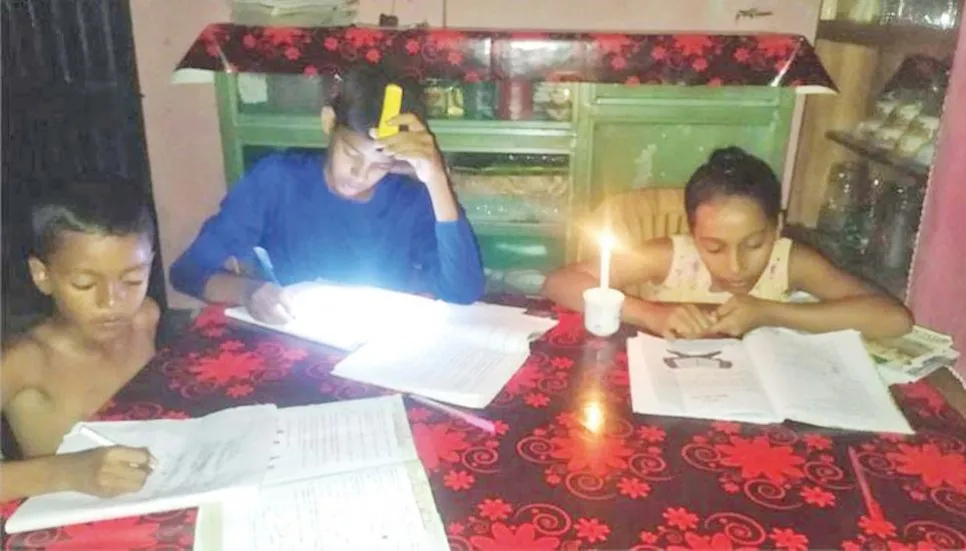
Sufferings of the people have intensified as Rangpur region experiences a severe heatwave along with frequent load-shedding.
Local sources said the electricity shortage is not only disrupting people's sleep at night but also significantly impacting trade and commerce.
People have been experiencing power outages 8-10 times in 24 hours in Rangpur city. Each spell lasts for at least one hour. The scenario however is much worse in rural areas of the region.
Elderly people and children have become the worst sufferers due to prevailing seasonal fever, cough and other diseases.
According to the Rangpur Met office, the highest temperature in Rangpur was recorded at 36 degrees Celsius on Tuesday noon. The temperature has been fluctuating from 36- 37 degrees Celsius for the last few days in the district, said, Mostafizur Rahman, an officer in charge of the Rangpur Met office,
Production in mills and factories has been badly hampered. The hot spell affected especially day labourers, farm workers, rickshaws and van pullers limiting their income as people rarely come out of the home.
Academic activities in schools and colleges have also been seriously hampered due to frequent power outages amid the heavy wave. Students feel reluctant to attend full classes in the schools amid the high temperature.
When asked, Chief Engineer, Northern Electricity Supply Company (NESCO) LTD Rangpur Division, Mohammad Ashraful Islam said, “ The power supply according to the demand fell short. So, we have to manage the shortage by giving load shedding.”
“We need at least 1050- 1100 MW to meet the demand of power supply for eight districts in Rangpur division while we are getting around 700 MW, “ he added.
He also said the Boropukuria coal-fired power plant in Dinajpur having a capacity of 525 MW production tripped on Monday due to a technical glitch aggravating the situation.
Mohammad Shajahan Miah, a secondary assistant head teacher of a school in the city and who is also a resident of Nurpur area of Rangpur city said, “We have been experiencing frequent power outages amid the ongoing heat wave.”
Students frequently apply for morning school and half school because of the high temperature coupled with frequent power outages during school time.
The foul weather and frequent power cuts will cause learning losses for the students, he added.
Prottasa Begum, a student of class ten in the Robertsongonj area of the city said, “We can’t continue our study smoothly at school and home due to frequent power cuts amid the heatwave.”
Jahurul Islam, a super shop owner at Rangpur Super Market said, their business has been badly hampered as the customers show less interest in visiting the market for shopping due to boiling temperature amid the power outages.
Mahabub Rhaman Habu, public relations officer of Karupannya, an apparel factory in the city said, the company is full-fledged foreign export-oriented and it runs 24 hours. Frequent power outages disrupted factory production severely. Production cost rises high. We often miss our foreign export deadline. We have to run our generator machine for almost eight hours to minimize the losses of the production.
An official of Power Grid Company, Bangladesh, an enterprise power development board Regional Load Disburse Centre at BOGRA, requesting unnamed said, the supply is not stable now from the national power grid is according to the demand.
If the Borobudur power station, Dinajpur functions properly, the crisis could be solved considerably.
He, however, said the power demand has increased much nowadays due to ongoing heat waves and agriculture.
Nur Nabi, a van puller in the Mahadebpur area of the city said, it becomes tough to pull a van during the daytime amid the rising temperature. Frequent load shedding keeps us awake till late at night and hampers slumber and health badly.
Mostafizur Rahman, a farmer at Moyenpur village in Rangpur’s Mithapukur Upazila said, that vegetable farming including paddy cultivation will be badly hampered due to frequent power cuts. The farmers feel reluctant to work in the farmlands because of the scorching temperature. Frequent power cuts caused huge suffering to the people’s lives in the village.
Abu Bakar Siddique, a farmer of Gadha village in Nilphamari district’s Kishoregonj Upazila said, frequent load shedding caused huge sufferings to the village life.
The heat wave has hampered the Aman paddy fields badly. Farmers have to spend additional amounts to irrigate the Aman paddy field as it becomes dried up fast amid high temperatures.
An agricultural scientist, Mamunur Rashid said the inclement weather takes a severe toll on the people’s lives and the agriculture in the region.
Due to severe heat stress, plants often lose their leaves. Buds, blossoms, and growing fruits in the trees get hampered. Soil temperature rises above an optimum threshold. Thus, water and nutrient uptake of plants has been impeded causing damage to plant components. Besides, more irrigation is required in rising temperatures for paddy fields, vegetables and fruits. The hot spell causes underground water depletion in many places of the districts in the division that has been hampering the agriculture system.
The adequate rainfall will however ease the sufferings of the farmers and agriculture, he noted. .
NESCO Executive Engineer, Kurigram, Atiqur Rhaman said, the supply is almost half according to the demand in the district.
General Manager, Lalmonirhat- Kurigram Rural Electric Board Samittee Mohitul Islam said, “There are 5 lakh consumers in Kurigram District. We are getting a huge shortage of power supply against the demand. The shortage is around 35-40 per cent. So, it becomes difficult for us to maintain load management in the rural areas of the district.”